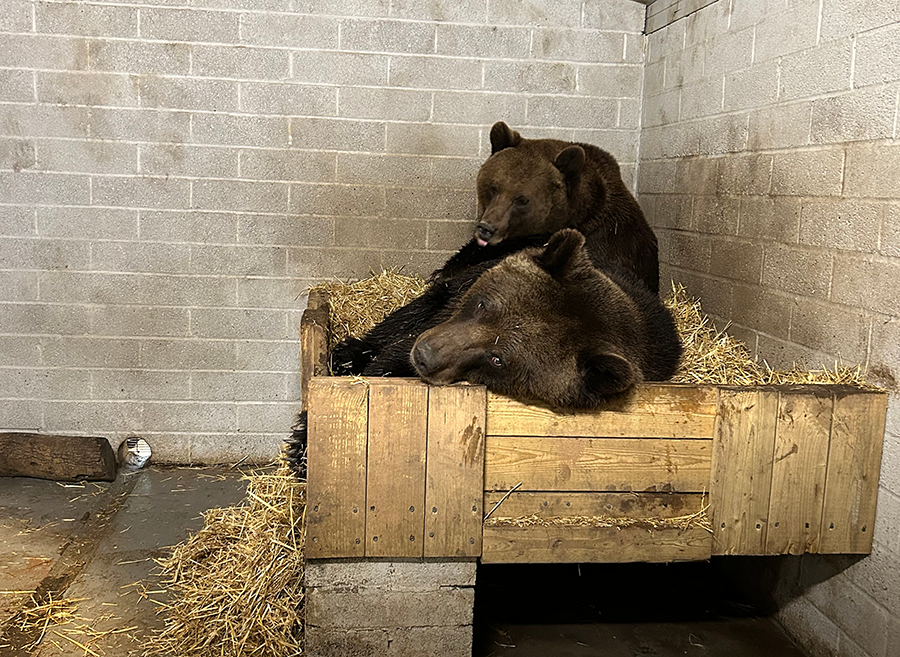Posted on: 30 October, 2023
When the temperatures drop and the nights start drawing in, you might feel like you want to sleep away the winter and wake up in spring.
Well, that might not be possible for us humans, but it is for the bears at Bristol Zoo Project!
 The four European brown bears of Bear Wood – Neo, Nilas, Albie and Gemini – are currently preparing for their months of torpor (a lighter form of hibernation). Keepers expect them to enter their deep sleep around mid-November, and re-emerge in February or March next year.
The four European brown bears of Bear Wood – Neo, Nilas, Albie and Gemini – are currently preparing for their months of torpor (a lighter form of hibernation). Keepers expect them to enter their deep sleep around mid-November, and re-emerge in February or March next year.
Senior Mammal Keeper, Zoe Norman, says “In the last week their activity has started winding down, and their appetites have been reducing. We’ve been fattening them up with lots of apples, pears, berries and nuts, so they’ve got enough fat stores for over the colder months. We’re tapering off their food intake now, otherwise they’d try and stay awake to eat more!
“They’ve also been doing some digging in their outside area, which is something they would do in the wild to make cosy tunnels. However, we encourage them to sleep in the Bear House so that we can monitor them better, and so the wolves don’t annoy them when they’re trying to sleep!”
The bears have specially-made wooden beds in the Bear House, which is then filled with up to four feet of straw for them to snuggle up in. They naturally sleep in their sibling pairs, with brothers Neo and Nilas on one side of the house, and Albie with his sister Gemini on the other.
While they’re asleep, the bears’ bodily functions slow down, but their muscles don’t atrophy, they don’t get bedsores and their kidneys function as needed – an amazing ability that still isn’t fully understood by animal experts.
The bears will lose some weight over their period of torpor, and continue losing weight for the first few months they’re awake. They can lose up to one third of their total body weight!
The winner of the ‘Most Weight Lost’ award last year was Neo, who lost 64kg. At 338kg currently, he is by far the biggest of the bears at Bristol Zoo Project. Amazingly, since all four are young, they’re still growing year on year. Gemini, as the smallest, is very nearly at her expected final weight, but the three boys will continue to get even bigger.

Where European brown bears live in the wild – in countries such as Russia, Romania, Sweden and Estonia – food can be scarce over winter, so they eat lots when food is abundant and then hibernate over the colder months to conserve energy. This won’t be a full sleep, so if any other bears came along they’d still be able to defend themselves.
Zoe says “At Bristol Zoo Project, we encourage these natural behaviours as much as possible, but zoos mirroring the conditions of torpor is still a relatively new practice. This means that a lot of it comes down to trial and error to see what works best for the bears – last year, we had to quickly find more bedding to give them as they were getting restless.
“The Bear House is made as dark and cosy as possible over winter, with no lights left on and minimal keeper involvement. The team will occasionally change the bears’ water or offer them a little bit of food if they start walking around, but we maintain a hands-off approach as much as possible. We also encourage visitors to stay quiet around the Bear House, so as not to disturb them when they’re sleeping.”
Bears, alongside the other inhabitants of Bear Wood – wolves, lynxes and wolverines – used to roam Ancient Britain 10,000 years ago. Due to hunting and habitat loss, they’re now extinct in the British Isles. Every visit to Bristol Zoo Project helps to support our conservation efforts and prevent species extinction.
Make sure to book your visit soon to see the bears before they go into torpor! Over winter you’ll be able to watch them snoozing in their house on our Bear Cam, which is on the main walkway in Bear Wood.
 Bear Wood is proudly sponsored by our partners Natracare.
Bear Wood is proudly sponsored by our partners Natracare.